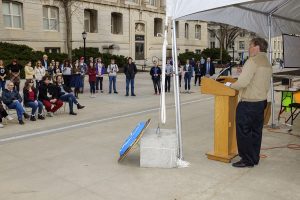UI researchers begin study to understand how children recognize and comprehend words
Researchers at the UI will begin studying how children in the Cedar Rapids and Iowa City School Districts recognize and comprehend words.
The Iowa City Community School District sign is seen on Nov. 5, 2018
March 27, 2019
Upon hearing a word, a person’s brain begins a process of determining what the word is in two-tenths of a second before they’ve even heard the entire word.
Bob McMurray, a UI professor of psychology and brain science, hopes to better understand how words are processed in the brain through the use of eye-tracking technology. Beginning in the fall, he will begin to study how children recognize the words they hear.
McMurray has partnered with the Cedar Rapids and Iowa City School Districts to conduct the research. Currently, researchers are screening around 1,000 children between kindergarten and second grade to participate. The children selected this spring for the study will be observed by the researchers over four years, McMurray said.
In the study, pictures of different items will be presented to children on a screen. The researchers will then tell the children a word and watch how the child’s eyes move between pictures of words that begin the same, McMurray said.
Researchers have found that people look at the words that start with similar sounds to determine the meaning even before hearing the end of the word, McMurray said. Through this, researchers are able to determine what people were thinking before they were able to tell the researchers, he said.
“What we try to study in my lab is, ‘Well, what do you do at that moment? What do people do while they’re kind of waiting for that, think of it as a type of ambiguity, to be solved?’ ” McMurray said. “The eye-trackings that we use are really designed to help us figure out the answer to that question.”
Through the study, he hopes to determine how differences in word recognition affect a child’s reading and language outcomes, he said.
RELATED: Team co-led by UI biologists gene key to human hearing
Researchers believe that children with language problems aren’t always able to determine what word they’re hearing in the amount of time it takes other children, said J. Bruce Tomblin, a UI professor emeritus of speech pathology. Children with poor language skills know the words they hear, but they can’t rule out similar sounding words, he said.
“We started looking at this process using this eye-tracking method [McMurray] uses, and it began to reveal some interesting things about how children with poor language were having subtle difficulties activating the right word and inactivating the other words,” Tomblin said.
With a push for continued education, children with language difficulties may struggle with communication and language skills that become important to achieve at higher levels, Tomblin said. The study will help researchers get a better understanding of why those children are struggling, he said.
Researchers are working to create the eye-tracking simulation and compile a list of words for the study, said Dana Urbanski, a graduate student in communication sciences involved with the research.
The researchers have also tested adults to see if they would get the outcomes they expected, and from there, they can begin working on the tests for children, she said. Without knowing if they were getting the correct pattern in adults, it would be difficult to understand the data collected from the children, she said.
“Learning words and learning to read is a very complex process, and we just don’t really appreciate that because it comes so automatically to us, but it’s incredibly, cognitively complex,” Urbanski said. “From just a basic science standpoint, it’s important that we have a better idea of how this process works developmentally.”







